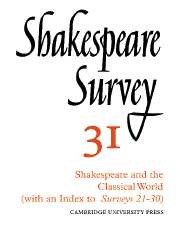Book contents
- Frontmatter
- The Ancient World in Shakespeare: Authenticity or Anachronism? A Retrospect
- ‘A Piece of Skilful Painting’ in Shakespeare’s Lucrece
- Philomel in Titus Andronicus and Cymbeline
- Apuleius and the Bradleian Tragedies
- ‘The Choice of Hercules’ in Antony and Cleopatra
- Structure, Inversion, and Game in Shakespeare’s Classical World
- Truth and utterance in The Winter’s Tale
- Adumbrations of The Tempest in A Midsummer Night’s Dream
- The Old Honor and the New Courtesy: 1 Henry IV
- Henry V: the Chorus and The Audience
- ‘The Devil’s Party’: Virtues and Vices in Measure for Measure
- Shakespeare and the Healing Power of Deceit
- Shakespeare’s Man Descending a Staircase: Sonnets 126 to 154
- A New View of Bankside
- Comedies and Histories at Two Stratfords, 1977
- Tamburlaine the Great Re-discovered
- The Year's Contributions to Shakespearian Study 1 Critical Studies
- 2 Shakespeare’s Life, Times, and Stage
- 3 Textual Studies
- General Index to Surveys 22–30
- Index
- Plate Section
Apuleius and the Bradleian Tragedies
Published online by Cambridge University Press: 28 March 2007
- Frontmatter
- The Ancient World in Shakespeare: Authenticity or Anachronism? A Retrospect
- ‘A Piece of Skilful Painting’ in Shakespeare’s Lucrece
- Philomel in Titus Andronicus and Cymbeline
- Apuleius and the Bradleian Tragedies
- ‘The Choice of Hercules’ in Antony and Cleopatra
- Structure, Inversion, and Game in Shakespeare’s Classical World
- Truth and utterance in The Winter’s Tale
- Adumbrations of The Tempest in A Midsummer Night’s Dream
- The Old Honor and the New Courtesy: 1 Henry IV
- Henry V: the Chorus and The Audience
- ‘The Devil’s Party’: Virtues and Vices in Measure for Measure
- Shakespeare and the Healing Power of Deceit
- Shakespeare’s Man Descending a Staircase: Sonnets 126 to 154
- A New View of Bankside
- Comedies and Histories at Two Stratfords, 1977
- Tamburlaine the Great Re-discovered
- The Year's Contributions to Shakespearian Study 1 Critical Studies
- 2 Shakespeare’s Life, Times, and Stage
- 3 Textual Studies
- General Index to Surveys 22–30
- Index
- Plate Section
Summary
Apuleius of Madaura, the rhetorician and neo-Platonic philosopher of the second century A.D., had a reputation in the Renaissance sufficiently great to have the Humanists, Vives and Erasmus, urge the study of his works for their logic and matter. Many poets and dramatists of the Elizabethan period, including Chapman, Dekker, Thomas Heywood, Jonson, Marlowe, and Spenser, did read the one work of Apuleius which we still enjoy today, the Metamorphoses, a comic novel of bestial transformation ending in a religious conversion. The work was translated as The Golden Asse by William Adlington in 1566 and proved so popular that it went through four more editions before the end of the sixteenth century. In 1582 Gosson included the novel among those works which the dramatists were ransacking ‘to furnish the Playe houses in London’.
- Type
- Chapter
- Information
- Shakespeare Survey , pp. 33 - 44Publisher: Cambridge University PressPrint publication year: 1979

